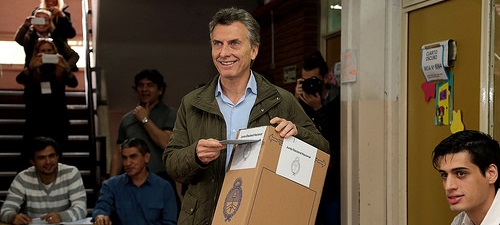 |
| Mauricio Macri, pictured casting his vote in the August primaries, united the Centre-Right and Centre-Left opposition to defeat the Kirchner candidate and become the first non-Peronist, non-UCR President. Photograph: Mauricio Macri vota by Mauricio Macri (License) (Cropped) |
After twelve years in power, the Kirchnerist faction of the Peronist movement, in the form of the Partido Justicialista, lost their grip on the Presidency of Argentina (Watts & Goni, 2015). In the second round of voting Mauricio Macri, leading the broad centre coalition Cambiemos, defeated the Justicialista, and former President Cristina Fernandez de Kirchner, backed Frente para la Victoria candidate Daniel Scioli (BBC, 2015).
Macri's victory has been received positively as, possibly, the beginning for a new moderate Argentina (Cottle, 2015). And yet, while neoliberals, in particular, rejoice in a pro-market victory, Macri's Presidency has only come with the complicity of the centre-left, specifically the Union Civica Radicale (UCR, Radical Civic Union).
That tentative alliance raises the question of whether, sooner or later, those with Left-wing tendencies, particularly within UCR, will feel the need to go their own way - though there is a lot of work ahead before a progressive slate could win without some sort of agreement with, or against, the Peronist movement.
Not the least consideration is that the election of the conservative liberal Mauricio Macri will not, alone, be enough to change the direction of Argentina. Although, the defeat of Kirchner's populist Peronist candidate - which has brought a positive response from neoliberal pro-market voices - has been regarded as a new turn for Argentina and, possibly a little optimistically, the overthrow of populism (Rodriguez-Brizuela, 2015).
While the Peronists are still the largest group in the Congress, that may shift over the course of Macri's term as half of the Chamber of Deputies is elected every two years in legislative elections. And the efforts already launched by Macri at tackling Argentina's immense economic challenges have received praise (The Economist, 2016). So, for the moment, the momentum is with Macri.
However, Macri's support came from a coalition primarily divided between the Centre-Right party Propuesta Republicana (Republican Proposal, PRO) and the Centre-Left party Union Civica Radical - backed by a mix of supporters from across the centre (The Argentina Independent, 2015). So what of Macri's Radical partners?
Despite the party's name, the UCR is a moderate centre-left party, seen by the harder Left as bourgeois, that has for decades been caught between other factions. The traditional opponents of the Peronists, some internal and breakaway factions such as the Radicales K have nonetheless found themselves sometimes allies with Peronist factions, in pursuit of reforms that promise social justice and improvements to the lives of citizens (La Nacion, 2006).
Yet the authoritarian character of the Justicialista - with fears ranging from electoral fraud to intimidation and suppression of the press, along with policies like the confiscation of pension funds to plug financial holes (Marty, 2015; Crandall, 2012) - seems to have helped align the UCR with the opposition. That has led the UCR on the path joining Cambiemos, despite its mainstream, globalising, neoliberal approach (Rodriguez, 2015).
Now, it would not be a surprise to see the election of 2015 presented as a contest between the market and the state. Yet in reality, it was more after the fashion of the statist, populist and nationalist Peronists, holding a long-term authoritarian grip on power, versus a broad opposition, that Macri has succeeded in rallying around his open and 'neoliberal' way - that embraces the global system.
That is a story replicated across Europe in different shades - liberals and social democrats shackled to the neoliberal mainstream, in the face of rising fear and nationalism, rallying to protect positive gains embodied in the the establishment institutions. So why, the question might well be asked, would or should the Centre-Left consider breaking away from the Centre-Right? It is certainly clear that the global economic crisis is not over and that populist nationalism has not retreated - even in Argentina after its defeat.
The answer is because, ultimately, neoliberalism is no friend to social progress.
For all his moderate liberal credentials, as Mayor of Buenos Aires Mauricio Macri behaved in a typically neoliberal way - defunding social programs in search of competition at the expense of social security (Esperanza Casullo, 2015). And Argentina's Macrinomic path out of its present crisis will likely follow the same austerian path as many countries in Europe - particularly the UK under George Osborne Chancellorship.
But that doesn't mean that some overnight, clean break is imminent. Progressives in Argentina must build gradually towards an unshackling, because the election demonstrated that there is not yet much of a political space for a radical alternative to Peronist statism or the neoliberal market. Yet Macri's election has levered open the door and progressives must step into that new space to develop a fresh consensus around a just, sustainable and liberating alternative, amenable to the building of broad Left movement.


